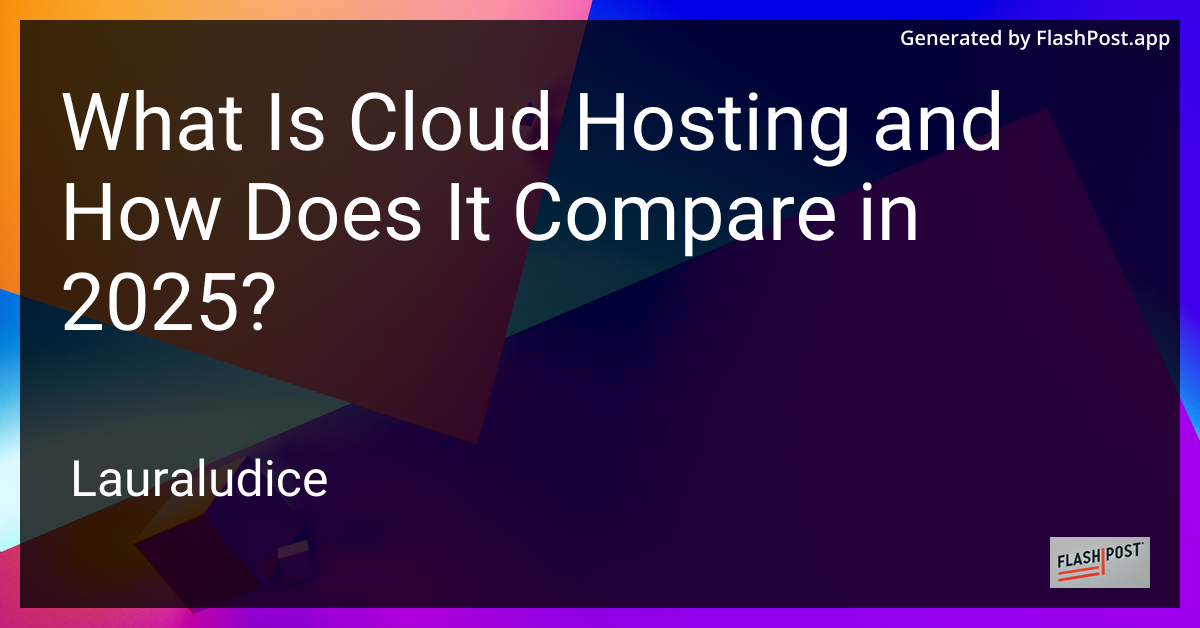
In the rapidly evolving landscape of technology, cloud hosting continues to be a pivotal solution for businesses and developers alike. As we venture into 2025, understanding cloud hosting and its advancements is crucial for making informed decisions about digital infrastructure. This article delves into what cloud hosting is and how it compares in 2025, highlighting the key benefits that make it a preferred choice over traditional hosting solutions.
What is Cloud Hosting?
Cloud hosting leverages virtual servers to manage websites and applications. Unlike traditional hosting, where resources are limited to a single server, cloud hosting taps into a network of interconnected servers disseminated across different locations. This distributed approach enhances reliability, scalability, and performance. Cloud hosting offers flexibility in resource allocation, ensuring that websites and applications don't face downtime due to server failures.
Key Features of Cloud Hosting
-
Scalability: Cloud hosting allows seamless scaling of resources based on demand. Whether experiencing unexpected traffic spikes or steady growth, the cloud instantly adjusts, ensuring optimal performance.
-
Reliability: With data mirrored across multiple servers, the risk of downtime decreases significantly. In the event of a server failure, another server swiftly takes over, maintaining uninterrupted service.
-
Performance: The global network of servers ensures that users are connected to the fastest server available, minimizing latency and load times.
-
Cost-efficiency: Pay-as-you-go models ensure that you only pay for the resources you use, making cloud hosting a cost-effective choice.
-
Security: Up-to-date security measures and protocols safeguard data and applications, keeping cyber threats at bay.
Cloud Hosting in 2025
As we peer into 2025, cloud hosting continues to evolve, harnessing the power of advanced technologies like artificial intelligence (AI) and machine learning (ML) to enhance service delivery. Here's how cloud hosting compares in 2025:
Enhanced Automation and AI
In 2025, cloud hosting providers are increasingly integrating AI and automation for efficient resource management, predictive maintenance, and security enhancements. This shift helps businesses optimize their operations, reduce manual interventions, and improve their digital experiences.
Edge Computing
The rise of edge computing enhances cloud hosting by bringing data processing closer to the source. In 2025, this trend is more pronounced, with businesses leveraging edge networks for faster data processing, reduced latency, and increased bandwidth efficiency.
Personalized Hosting Solutions
The demand for tailored solutions grows, and cloud hosting providers are responding with customized offerings based on specific business needs. This trend is evident in sectors like e-commerce, where personalized services enhance user engagement and conversion rates.
Sustainability Efforts
As sustainability becomes a focal point, cloud hosting providers in 2025 focus on eco-friendly practices, leveraging renewable energy sources, and optimizing data center energy efficiency to minimize carbon footprints.
Making the Switch
Switching to or between cloud hosting providers can be seamless with the right guidance. If you're considering switching web hosting providers, ensure thorough research and planning to maintain service continuity and avoid disruptions.
Conclusion
Cloud hosting remains at the core of digital transformation in 2025, offering unmatched scalability, reliability, and performance. For developers using frameworks like Svelte or Vue.js, choosing the best cloud hosting provider is crucial to leverage these benefits fully. As cloud technology continues to advance, staying informed and embracing these innovations can propel businesses into new realms of digital success.